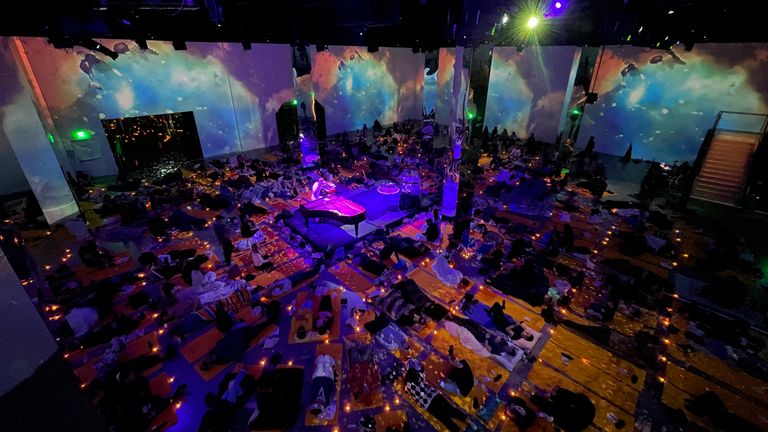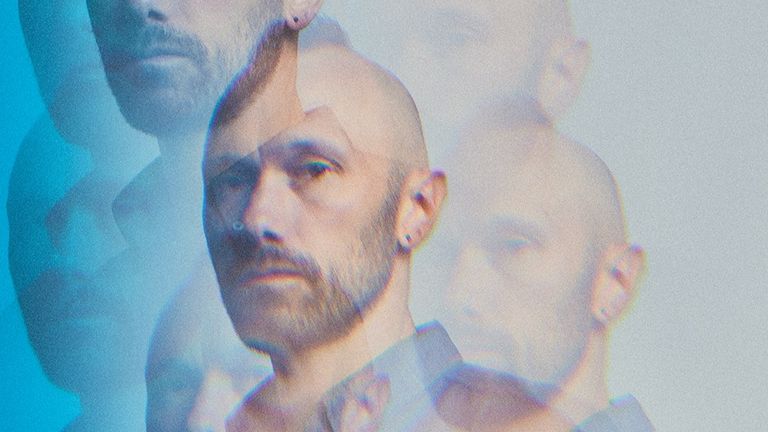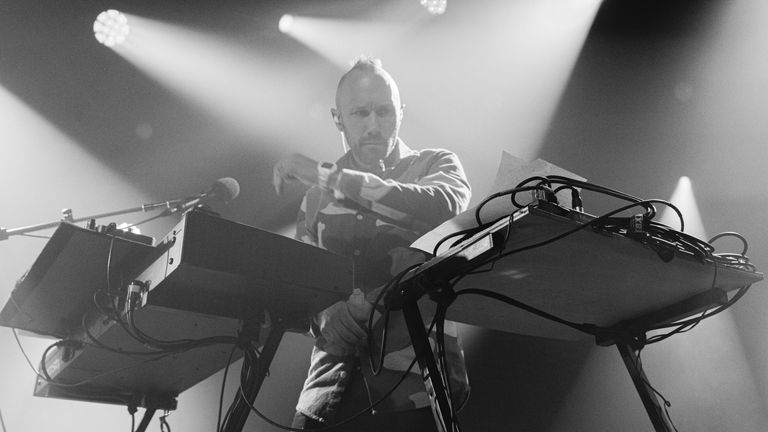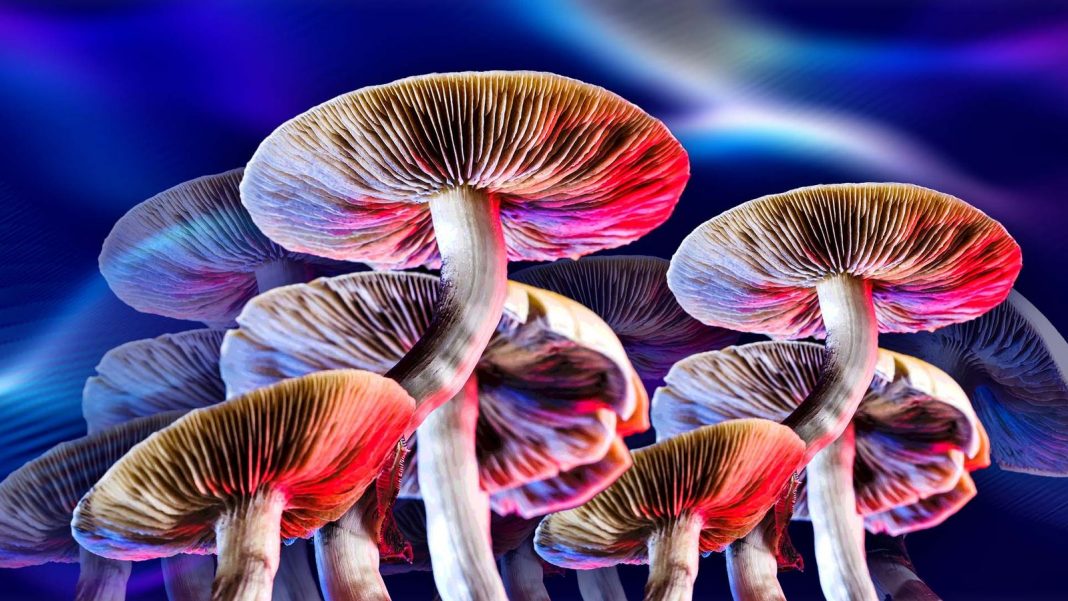At East Forest’s ceremonial concerts, listeners are given the space to lie down on mats to take in the music. You could be looking at a yoga class; a dimly lit room filled with bodies sprawled savasana-style, aromatherapy oils wafting in the air.
It certainly doesn’t sound like a typical music gig.
The US electro-acoustic artist has long been pairing music with psychedelics, leading his first small magic mushroom ceremonies more than 15 years ago. While the use of drugs at his shows is not actively encouraged – in most places around the world this would be illegal – those who enjoy his work are aware they might experience the night differently should they choose to partake beforehand.

This fusion of music and psychedelics is not new, with scientific studies on the combined effects dating back to the 1950s and ’60s – and high-profile artists throughout time, from The Beatles to Miley Cyrus, having spoken about their use of mind-altering substances.
But the therapeutic benefits, rather than the hedonistic element, is something a growing number of artists and DJs have started exploring in recent years.
At the same time, more and more scientists – and even Prince Harry – are arguing the physical and mental health benefits, and laws in some countries are relaxing; Australia became the first country to legalise medical psychedelics earlier this year, Oregon and some US cities have done the same, and there are MPs in the UK also calling for reclassification.
For East Forest, whose real name is Trevor Oswalt, his shows and music are a chance to “give people more openings and options, to say, maybe you can be a little more vulnerable or you can go a little deeper”, whether they have taken anything beforehand or not.

US artist East Forest. Pic: George Evan
“I want it to feel inclusive… It’s not like we’re pushing in one direction or another and whatever entry point you come into it, it should work for you. If you want it to just be a concert, you sit or stand like any concert – great. And if you want to go a little deeper, that doorway is there for you, too.”
He adds: “For many people we see, they don’t do that at all and they have their own equally powerful experience.”
Magic mushrooms are currently a Class A drug in the UK, with the maximum penalty for possession being up to seven years in prison, an unlimited fine, or both. The maximum penalty for supply or production is life in prison.
Some experts say more research is needed into the benefits of psilocybin, the psychoactive compound found in magic mushrooms. The NHS lists it among the drugs that can potentially trigger psychotic episodes, while anti-drug advisory service FRANK warns of the risks of losing “complete control” and that a “bad trip” can potentially make mental health problems worse.
In October, a US court heard that an off-duty pilot who allegedly tried to shut down a plane’s engines during a flight told police after his arrest he had taken psychedelic mushrooms for the first time.

Pic: Cdigi
But many studies have shown it can have a positive impact on those with mental health conditions such as depression, anxiety, PTSD, anorexia and alcohol abuse. Other studies have shown that psilocybin can affect the way the brain reacts to music, enhancing the emotional response.
Oswalt has just released his latest album, Music For The Deck Of The Titanic, which follows previous works including Music For Mushrooms, IN: A Soundtrack For The Psychedelic Practitioner Vol II, and a collaborative album with spiritual teacher, psychologist, and author Ram Dass. He is set to release a documentary, also titled Music For Mushrooms, in 2024.
He is not the only musician who believes in the power of psychedelics. Electronic star Jon Hopkins, who is also known for producing for acts including Coldplay and Brian Eno and has collaborated with East Forest, released the album Music For Psychedelic Therapy in 2021; his almost namesake the Johns Hopkins University has a centre dedicated to psychedelic and consciousness research in Baltimore, Maryland, and has put together one of several psychedelic therapy playlists on Spotify.
Read more:
Psychedelic compound opens up depressed brains, study suggests
Magic mushrooms ‘could help women deal with cancer-related depression’
Oswalt says legalisation is “inevitable” and “should happen – because no one should be in jail for a non-violent crime that involves a substance, especially one that’s naturally growing – potentially in your backyard”.
This content is provided by Spreaker, which may be using cookies and other technologies.
To show you this content, we need your permission to use cookies.
You can use the buttons below to amend your preferences to enable Spreaker cookies or to allow those cookies just once.
You can change your settings at any time via the Privacy Options.
Unfortunately we have been unable to verify if you have consented to Spreaker cookies.
To view this content you can use the button below to allow Spreaker cookies for this session only.
Click to subscribe to Backstage wherever you get your podcasts
Now, more thought needs to be put into access, he says. “Some have a lot more support… anything from having the resources to go to another country or see therapists or [pay] thousands of dollars for [legal treatment] centres. What about the people who don’t?
“My interest is in people having positive, safe experiences and I really believe that music is one of the most effective ways to help and guide people and democratise that. Because I can put a five-hour album called Music For Mushrooms on Spotify and it’s out there and people are going to it, just because of a title, they might decide to use that on a journey.”
However, he is aware psychedelics may not work for everyone. “It can be traumatic. These substances are not a panacea to solve any problem. It’s a tool. And it can also cause harm. And so I’m sort of a harm-reduction approach by bringing a tool like music into that space.”
At his shows, his partner, Marisa Radha Weppner, a trained psychedelic therapist in the US, plays a part in the experience to make it “more four-dimensional and immersive”, spraying scents and adding to the soundscape with bells and shakers. But she is also there to offer support if needed. “And maybe we have people in the room who are kind of like sitters, like psychedelic air marshals,” says Oswalt. “They’re kind of quiet, not obvious, but they’re there.”
But problems are extremely rare, he says, and heavy drinking is more likely to lead to difficulties at music gigs.
Plus, he points out, people are taking drugs of all kinds at gigs, festivals and on nights out all the time. “It’s not like this is unusual, right? I think the difference is we’re giving more care and support.”







